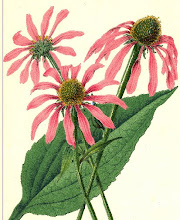 Speakers:
Speakers: Chanchal Cabrera MSc, FNIMH, (RH)AHG
Fiona Shakeela Burns MNIMH
Dates:Saturday May 21 2011 9am to 6pm
Sunday May 22 2011 9am to 5pm
Venue: Royal Botanic GardensEdinburgh EH3 5LR
Cost: £120 for the two days. Proceedings will be available to all delegates electronically after the event.
Early bird discount £100 (book before 1st April)
Thirty student places available at £80.
About the Symposium:A two day intensive course for practitioners looking at ways to design individualized, rational and effective holistic treatment plans. This is a unique opportunity to hear two speakers who have between them over 30 years of experience in working with cancer.
Chanchal has developed an integrated approach, often using herbs alongside orthodox medicine. She has gained insight on how to manage this very modern conundrum.
Chanchal will cover:
• decoding the diagnosis – what the tests mean and how to interpret that information in a clinical application
• designing a targeted treatment plan – specific strategies to address identified risks
• materia medica for cancer – the cyto-toxic herbs
• managing surgery, chemo and radiation – maximizing efficacy and mitigating harm
Shakeela: Healer Heal Thyself:Cancer has been Shakeela’s most powerful teacher and she is delighted to share some of the unique insights which she gained whilst on her own healing journey. She explains the ‘Seven Keys to Healing’ – the distinct keys that she has identified as being responsible for her recovery and how she now works with these to help other people who are dealing with cancer. Shakeela will explain how some of the ways that cancer is currently misunderstood and hence treated, in our current medical model, positively hinder healing. She will discuss how to go beyond these unhelpful beliefs and attitudes as well as clarifying our role as practitioners when it comes to working in this field.
Note:If you took Chanchal’s 3 day ‘Introduction to Holistic Oncology’ intensive in Manchester 2 years ago, this will be a great follow up with more specifics and formulas, including detailed strategies for specific conditions and more discussion of collaboration opportunities with allopathic medicine. All delegates will get a copy of Chanchal’s papers ‘The Bio-Mechanics of Cancer’ when you register. If you are new to this specialist field this is a good introduction.
Biographies:Chanchal Cabrera MSc, FNIMH, (RH)AHGChanchal has been a member of the National Institute of Medical Herbalists (UK) since 1987 and obtained her MSc in Herbal Medicine at the University of Wales in 2003. Her clinical specialty is helping people manage cancer. Chanchal has held the faculty chair in Botanical Medicine at the Boucher Institute of Naturopathic Medicine in New Westminster since 2004. She serves on the board of advisors of Dominion Herbal College in Burnaby, on the editorial board of Medical Herbalism clinical newsletter and she publishes widely in professional journals and lectures internationally on Medical Herbalism, nutrition and health.
Chanchal is the author of the book ‘Fibromyalgia – A Journey Toward Healing’ published by Contemporary Books. She is a certified Master Gardener and a certified Horticulture Therapist. Chanchal lives on Vancouver Island, British Columbia where she and her husband farm 7 acres. They grow food for 10 households, culinary herbs for restaurants and medicinal herbs for her clinic. They also run therapy gardens for people with disabilities and host internships in organic farming and herbal medicine. In 2009 Chanchal was honored with a Fellowship in the NIMH for service to the profession over 25 years.
www.chanchal@chanchalcabrera.comFiona Shakeela Burns MNIMH . Medical Herbalist, Advanced PSYCH-K, Matrix Reimprinting and EFT facilitator
Shakeela has been a member of the National Institute of Medical Herbalists (UK) since 1992. She became a Herbalist due to her experience of healing from leukaemia and sarcoma as a child. Her parents chose to take her to a naturopath in preference to orthodox medical treatment and with juices, herbs and radical dietary shifts, she was able to make a full recovery. Thirty years later, having been a Medical Herbalist for 16 years, she became ill with cancer for the second time – this time, metastasisied cervical cancer which had gone to the ovaries and the brain. Orthodox medicine offered no hope of cure and she was pronounced terminally ill by The Royal Marsden, London. With dedication and determination to heal herself, she embarked on her second healing journey and by June 08, just 10 months after the diagnosis, she no longer had any cancer in her body. Shakeela is passionate about the need for real education when it comes to cancer and believes in the body’s innate ability to heal. She now runs a busy practice in Bristol and has since been able to help many of the people who have come to her with diagnosis of cancer
http://dmtrk.net/t/24B-DRL2-3VWI0-599YD-1/c.aspxhttp://dmtrk.net/t/24B-DRL2-3VWI0-599YD-1/c.aspxhttp://dmtrk.net/t/24B-DRL2-3VWI0-599YE-1/c.aspxhttp://dmtrk.net/t/24B-DRL2-3VWI0-599YE-1/c.aspxClinical Case Management in Cancer Care: Botanical StrategiesSaturday 21st May:9.00 – 9.30: Registration.
9.30 – 12.00: Shakeela Burns: Healer Heal Thyself
12.00 – 1.00: Lunch
1.00 – 2.30: Context and Intention: The foundations of healing, therapeutic strategies (refresher from 2 years ago program)
2.45 – 4.15: Working with Chemo: Part
14.30 – 6:00: Working with Chemo:
Part 2Sunday
22nd May:9.00 – 10.30: Pain management in cancer
10.45 – 12.15: Managing bone metastases
1.15 – 2.45: Materia medica for cancer – the cyto-toxic herbs
3.00 – 4.00: Materia medica for cancer – the cyto-toxic herbs
4.00 – 5.00: Question and answer session with Shakeela and Chanchal
Tea and coffee is provided in the morning and afternoon sessions during each 15 minute break.
Please book early:To book a place please email:
dee@napiers.netInformation about accommodation, b\b, hotels, hostels and campsites can be provided.
There will also be an option to meet up for a social on Saturday evening.




















